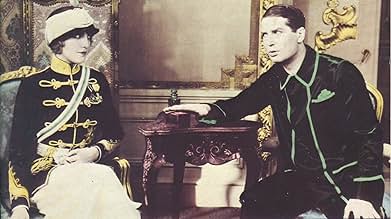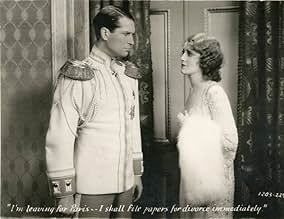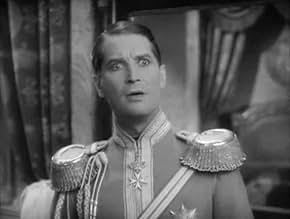IMDb-BEWERTUNG
7,0/10
2788
IHRE BEWERTUNG
Die Königin des mythischen Sylvania heiratet einen Höfling, der sein neues Leben als unbefriedigend empfindet.Die Königin des mythischen Sylvania heiratet einen Höfling, der sein neues Leben als unbefriedigend empfindet.Die Königin des mythischen Sylvania heiratet einen Höfling, der sein neues Leben als unbefriedigend empfindet.
- Für 6 Oscars nominiert
- 4 Gewinne & 6 Nominierungen insgesamt
Carl Stockdale
- The Admiral
- (as Carlton Stockdale)
Albert De Winton
- Cabinet Minister
- (as Albert de Winton)
Empfohlene Bewertungen
It was really the film that established Maurice Chevalier and Jeanette MacDonald as a musical comedy team - the first one of the American talkie period. They would make four films in the end (THE LOVE PARADE, ONE HOUR WITH YOU, LOVE ME TONIGHT, and THE MERRY WIDOW). Four first rate early musicals... and they did not like each other! Jeanette rebuffed Chevalier's attempts at a closer relationship (she only liked Gene Raymond, whom she later married). He considered her a prude and hypocrite as a result. So, despite their stunning screen chemistry and string of successes their partnership faded. Nelson Eddy was waiting in the wings for her to find the proper partner.
Chevalier is a Count who has been returned from a diplomatic post for a sexual scandal. The country is ruled by Queen Jeanette, and when she meets the charming Maurice she falls for him. They marry, but he finds that (under the guidance of her Prime Minister - Lionel Belmore - and his cabinet) she puts him aside on matters of ruling the state. Chevalier, normally the aggressor in sexual matters and in putting his own ideas out, does not like the self-image of being the boy-toy husband of the ruler of his native country. His idea would be more like that of Prince Albert, Queen Victoria's husband, who became her chief adviser on political matters after their marriage. Here, however, while everyone is polite to him, they make it clear that constitutionally he is not to be involved in running the government.
The film is a charming one - full of those "Lubitsch touches". For example, Chevalier's growing anger and impatience at his political uselessness is first shown when he asks one of the courtiers (who has just politely put him in his place), "Do you understand French?" "No, I'm afraid I don't.", says the courtier. Chevalier, with perfect timing, shoots out a long, furious diatribe of French, which one can tell is gutter language, to show his fury at his position - much to the dismay of the courtier. Later on, when the Prime Minister also puts down Chevalier's attempts at advice, he smiles and asks the Prime Minister, "Excuse me, but do you speak French?" Belmore looks at him puzzled, "Yes I do speak French." With an eat dirt smile, Chevalier says, "What a pity!" In the end, it is a financial crisis (which with typical Lubitsch humor can only depend on the foreign investors in Sylvanian securities, all of whom have to observe the reactions of the Afghan Ambassador - bearded Russ Powell - to a court function) that gives Chevalier his chance. Chevalier will only show his true love for his wife if she and the cabinet give him a voice in public affairs like Prince Albert had. And they give in.
It would not be the last visit Hollywood paid to Sylvania. Unlike other Balkan pseudo-states, it actually reappeared four years later, though under more "sinister" circumstances. In 1933 the Sylvanian Ambassador to a neighboring country tried to use underhanded means to bring about it's annexation by his homeland. However, Ambassador Trentino (Louis Calhern) did not count upon the Dictator of Freedonia (Rufus T. Firefly - Groucho Marx) and his three brothers to force him to surrender in a barrage of vegetables and fruit in DUCK SOUP.
Chevalier is a Count who has been returned from a diplomatic post for a sexual scandal. The country is ruled by Queen Jeanette, and when she meets the charming Maurice she falls for him. They marry, but he finds that (under the guidance of her Prime Minister - Lionel Belmore - and his cabinet) she puts him aside on matters of ruling the state. Chevalier, normally the aggressor in sexual matters and in putting his own ideas out, does not like the self-image of being the boy-toy husband of the ruler of his native country. His idea would be more like that of Prince Albert, Queen Victoria's husband, who became her chief adviser on political matters after their marriage. Here, however, while everyone is polite to him, they make it clear that constitutionally he is not to be involved in running the government.
The film is a charming one - full of those "Lubitsch touches". For example, Chevalier's growing anger and impatience at his political uselessness is first shown when he asks one of the courtiers (who has just politely put him in his place), "Do you understand French?" "No, I'm afraid I don't.", says the courtier. Chevalier, with perfect timing, shoots out a long, furious diatribe of French, which one can tell is gutter language, to show his fury at his position - much to the dismay of the courtier. Later on, when the Prime Minister also puts down Chevalier's attempts at advice, he smiles and asks the Prime Minister, "Excuse me, but do you speak French?" Belmore looks at him puzzled, "Yes I do speak French." With an eat dirt smile, Chevalier says, "What a pity!" In the end, it is a financial crisis (which with typical Lubitsch humor can only depend on the foreign investors in Sylvanian securities, all of whom have to observe the reactions of the Afghan Ambassador - bearded Russ Powell - to a court function) that gives Chevalier his chance. Chevalier will only show his true love for his wife if she and the cabinet give him a voice in public affairs like Prince Albert had. And they give in.
It would not be the last visit Hollywood paid to Sylvania. Unlike other Balkan pseudo-states, it actually reappeared four years later, though under more "sinister" circumstances. In 1933 the Sylvanian Ambassador to a neighboring country tried to use underhanded means to bring about it's annexation by his homeland. However, Ambassador Trentino (Louis Calhern) did not count upon the Dictator of Freedonia (Rufus T. Firefly - Groucho Marx) and his three brothers to force him to surrender in a barrage of vegetables and fruit in DUCK SOUP.
Count Alfred (Maurice Chevalier) has disgraced his home country of Sylvania with one too many scandalous affairs with married women, and the ambassador of Sylvania commands him to return home. Alfred's manservant, Jacques (Lupino Lane), begs to come along, and his master relents. Alfred, burdened with a newly acquired French accent that makes him sound most un-Sylvanian, fears the wrath of his queen (Jeanette MacDonald). But instead of having him shot, she falls in love with him, and he with her. The entire kingdom, which has had nothing on its mind except seeing the queen get married, is thrilled. As Jacques and Lulu the maid (Lillian Roth) conduct their own romance, reveling in their commonness, Alfred discovers at the altar that his own marriage will be most uncommon - and a dire threat to his manhood. He may be marrying a queen, but he most definitely won't be a king.
Ernst Lubitsch directed this marvelous technical and artistic achievement back when other early sound films were still stumbling along. Four outstanding performances from four witty and charming performers (Chevalier, MacDonald, Lane and Roth) grace this lavishly produced musical comedy with its champagne-bubble songs and sexually-charged dialogue.
Ernst Lubitsch directed this marvelous technical and artistic achievement back when other early sound films were still stumbling along. Four outstanding performances from four witty and charming performers (Chevalier, MacDonald, Lane and Roth) grace this lavishly produced musical comedy with its champagne-bubble songs and sexually-charged dialogue.
This is very much like a Vienese operetta, with its principle couple - Chevalier and MacDonald - and its second couple, the help, who mirror the principle couple in a light way. The music often sounds like minor Johann Strauss or early Lehar, and the plot owes a lot to The Merry Widow.
Still, my favorite aspect of this movie is that, being pre-code, it constantly flirts with the edge of what could be dared in those days. It's never in any way obscene or vulgar, but it's constantly winking at the audience about matters sexual, and of course the last shot is of the couple in bed - one bed. Hollywood wouldn't enjoy that freedom for another 30 years.
It's all very light and, in the end, not very memorable, but along with One Hour with You, which I probably prefer, a very enjoyable way to spend an evening.
Still, my favorite aspect of this movie is that, being pre-code, it constantly flirts with the edge of what could be dared in those days. It's never in any way obscene or vulgar, but it's constantly winking at the audience about matters sexual, and of course the last shot is of the couple in bed - one bed. Hollywood wouldn't enjoy that freedom for another 30 years.
It's all very light and, in the end, not very memorable, but along with One Hour with You, which I probably prefer, a very enjoyable way to spend an evening.
As covered in previous comments The Love Parade is important historically, with it being Jeanette MacDonald's debut, Maurice Chevalier's second film, director Ernst Lubitsch's first sound picture and Chevalier and MacDonald's first pairing together. But The Love Parade still does manage as well to be, apart from some primitive sound quality, a great film and compares favourable within Lubitsch's mostly consistent(in a good way) filmography.
The costumes and sets in The Love Parade are wonderfully opulent and the photography is very stylishly done. Lubitsch's distinctive style is evident all through the film, bringing a huge amount of class, subtlety and elegance. What he also did brilliantly was making camera and sound effects more flexible counterpointing the music numbers, and also even for his first sound picture having a technical mastery already with apparently having two sets built for one number shot simultaneously with the orchestra off screen between the two sets, going back and forth in the editing, something that had never been done before. The songs are very pleasant and memorable at least, with the beautiful and catchy duet My Love Parade, the charmingly intimate Dream Lover and the hugely entertaining Let's Be Common faring the best. The choreography's elegant and poised and in other places witty and inventive, the highlight number in this regard being Let's Be Common.
The script was one of my favourite things about The Love Parade, it was very sophisticated and deliciously witty, particularly funny was the writing regarding the Count's political uselessness. There's even some sexual innuendo that was very ahead of its time back in 1929. The story is full of immense charm and sophisticated style with a seductive edge, not ever making the mistake of being dull or improbable(and if it did really it would not be as glaring as the story in Monte Carlo). The characters are very likable and the performances from all four leads do not disappoint at all. Noteworthy especially were MacDonald whose screen debut was a revelation being both sexy and regal and singing like an angel and Lupino Lane whose incredible physical comedy is enough to make one seethe with envy. Sassy Lillian Roth sparkles as Lane's partner and Chevalier is the epitome of Gallic warmth and charm. The chemistry between him and MacDonald beguiles and for two relatively different singing styles they blend remarkably well when singing together.
Overall, a great film. While I may prefer The Merry Widow, Heaven Can Wait, The Shop Around the Corner and especially Trouble in Paradise over The Love Parade it is unsurprising that The Love Parade was a huge hit at the time and still wins over people now. 9/10 Bethany Cox
The costumes and sets in The Love Parade are wonderfully opulent and the photography is very stylishly done. Lubitsch's distinctive style is evident all through the film, bringing a huge amount of class, subtlety and elegance. What he also did brilliantly was making camera and sound effects more flexible counterpointing the music numbers, and also even for his first sound picture having a technical mastery already with apparently having two sets built for one number shot simultaneously with the orchestra off screen between the two sets, going back and forth in the editing, something that had never been done before. The songs are very pleasant and memorable at least, with the beautiful and catchy duet My Love Parade, the charmingly intimate Dream Lover and the hugely entertaining Let's Be Common faring the best. The choreography's elegant and poised and in other places witty and inventive, the highlight number in this regard being Let's Be Common.
The script was one of my favourite things about The Love Parade, it was very sophisticated and deliciously witty, particularly funny was the writing regarding the Count's political uselessness. There's even some sexual innuendo that was very ahead of its time back in 1929. The story is full of immense charm and sophisticated style with a seductive edge, not ever making the mistake of being dull or improbable(and if it did really it would not be as glaring as the story in Monte Carlo). The characters are very likable and the performances from all four leads do not disappoint at all. Noteworthy especially were MacDonald whose screen debut was a revelation being both sexy and regal and singing like an angel and Lupino Lane whose incredible physical comedy is enough to make one seethe with envy. Sassy Lillian Roth sparkles as Lane's partner and Chevalier is the epitome of Gallic warmth and charm. The chemistry between him and MacDonald beguiles and for two relatively different singing styles they blend remarkably well when singing together.
Overall, a great film. While I may prefer The Merry Widow, Heaven Can Wait, The Shop Around the Corner and especially Trouble in Paradise over The Love Parade it is unsurprising that The Love Parade was a huge hit at the time and still wins over people now. 9/10 Bethany Cox
the sort of film that filmmakers to day are unable to make. it is too simple for them. it has a story with a beginning, middle and end. far too simple for the current crop of genius. the stars were real stars i swear they sometimes glittered. the directors famous touch was in fine form and even after many years i can remember walking home in a romantic glow. could anyone do the same after watching one of to days EPICS. i agree there must have been sound faults and other technical problems though i do not remember them. later on i heard a radio version also enjoyed. like far too many films of the past the love parade is unavailable to us on video or DVD. it may have been damaged and no longer usable though i do hope not. if there is any way to urge the current copyright owners to re-issue the film i would certainly like to be involved. are there other enthusiasts out there who agree?
Wusstest du schon
- WissenswertesConsidered by many to be the first musical film in which the songs were integrated with the story.
- PatzerThe fact that Count Alfred (Maurice Chevalier) speaks with a French accent, even though he is not supposed to be French, is really not an "error". However, by adding a scene to attempt to explain this anomaly, it only serves to highlight the accent discrepancies in the casting. For instance, in contrast to the accent discrepancy with Chevalier's character, no one seems to notice that his French servant, Jacques (Lupino Lane), speaks British English with no discernible French accent.
- Zitate
Queen Louise: Why am I always awakened from my dreams?
- Alternative VersionenThere is an Italian edition of this film on DVD, distributed by DNA Srl: "IL PRINCIPE CONSORTE (1929) + AMAMI STANOTTE (1932)" (2 Films on a single DVD), re-edited with the contribution of film historian Riccardo Cusin. This version is also available for streaming on some platforms.
- VerbindungenFeatured in Göttinnen der Liebe (1965)
Top-Auswahl
Melde dich zum Bewerten an und greife auf die Watchlist für personalisierte Empfehlungen zu.
- How long is The Love Parade?Powered by Alexa
Details
- Erscheinungsdatum
- Herkunftsland
- Sprachen
- Auch bekannt als
- The Love Parade
- Drehorte
- Produktionsfirma
- Weitere beteiligte Unternehmen bei IMDbPro anzeigen
Box Office
- Budget
- 650.000 $ (geschätzt)
- Laufzeit
- 1 Std. 47 Min.(107 min)
- Farbe
Zu dieser Seite beitragen
Bearbeitung vorschlagen oder fehlenden Inhalt hinzufügen


































